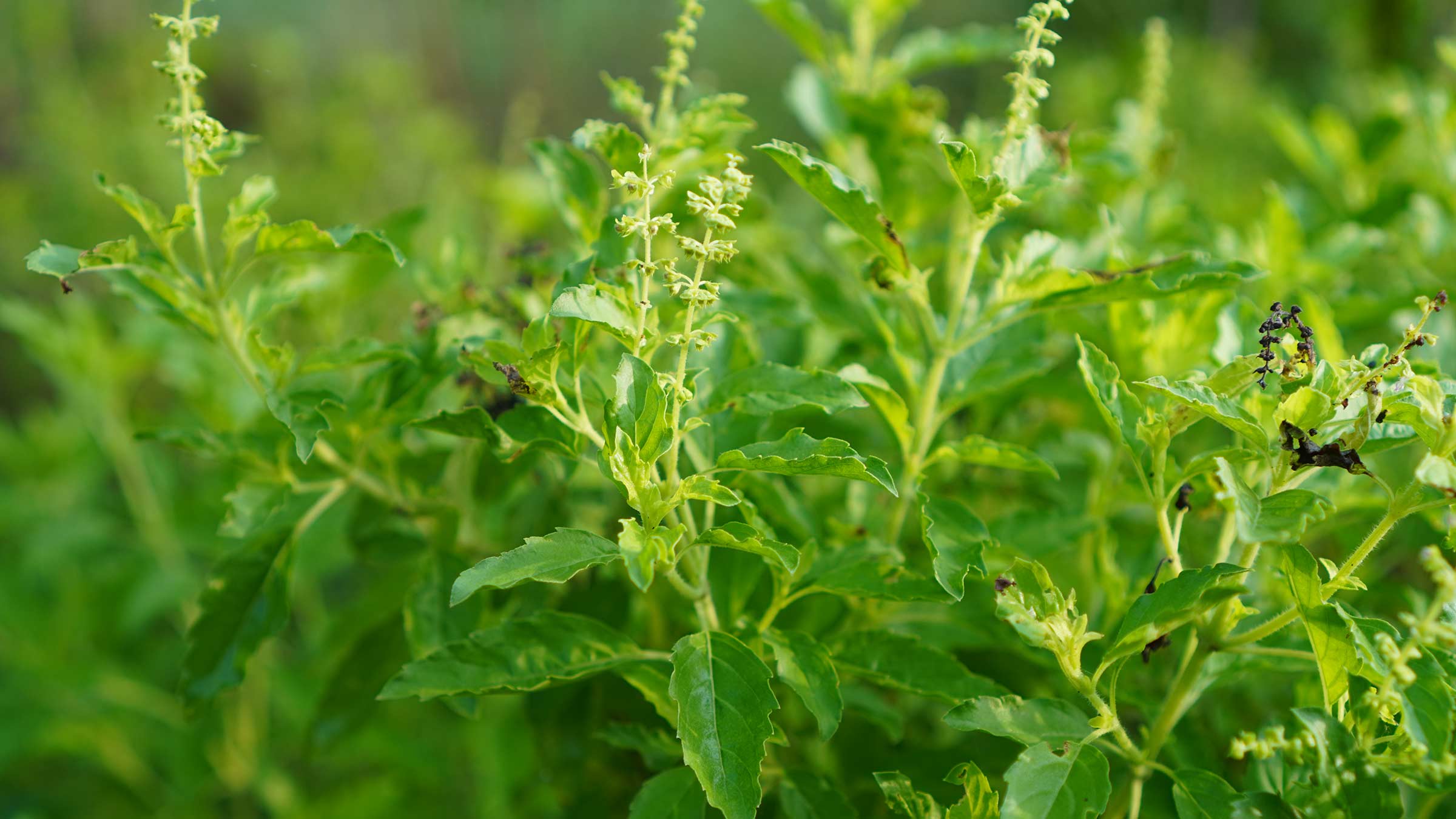
You may have heard of holy basil in certain corners of the health community. While it differs from the traditional basil used in things like pesto and Margherita pizzas, it has a long reputation for providing certain health benefits.
Here are some basics to keep in mind if you’re curious about adding it to your diet.
What is holy basil? How does it differ from basil commonly used in cooking?
Holy basil is an aromatic, perennial shrub that’s often used in ayurvedic medicine and considered a sacred plant in Hinduism. Its common name, tulsi, is a Hindu name for the plant and means “the incomparable one.”
There are many types of basil varieties that have differing uses. A traditional basil used in cooking is usually sought after for its sweet taste and flavor profile.
Holy basil has a flavor profile that’s often described as having a strong clove-like and peppery taste with notes of mint and lemon. It can be used in cooking, but it’s often sought more for its medicinal properties, which common basil doesn’t offer.
Where can I get holy basil?
Holy basil, both fresh and dried, is widely available in many local grocery stores, farmers markets and specialty Asian markets. Extracts are often sold at health food stores and online. You can also grow this herb yourself at home.
How do you take holy basil?
A few common ways people incorporate holy basil in their diets:
- As a tea — you can buy tulsi tea bags or make your own using dried tulsi herb, either buying in bulk or drying your own fresh leaves
- In capsule form as a supplement
- Eating the raw herb/using it in cooking — can also use tulsi powder
- As tincture, a concentrated liquid extract from the plant taken orally
What are some of the potential health benefits of taking holy basil?
Parts of the holy basil plant that are used for its medicinal properties include the leaf, stem, seed and oil. There are many potential benefits:
- Analgesic (painkilling) properties, thought to be due to the eugenol compound in the essential oil of the plant’s leaves
- Anticancer effects have been demonstrated in animal studies when taken topically or orally, attributed to the antioxidant compounds found in holy basil oil
- Anti-inflammatory properties, attributed to the linolenic acid (an essential fatty acid) found in the plant’s oil
- Lipid-lowering properties — some research done on animals has demonstrated lowered total cholesterol and triglycerides when taking holy basil leaf
- Anti-stress — holy basil is classified as an adaptogen, which means the plant contains compounds that help the body adapt to stress
- Blood sugar lowering effects
- Cardiovascular effects — decreased platelet aggregation and blood pressure lowering effects
Is holy basil safe to use?
Holy basil is generally safe for most people when used orally and topically on a short-term basis. Oral doses of 500mg daily have been shown to be safe for up to three months. When used as a mouthwash, research has shown holy basil to be safe as a 4% solution for up to four weeks.
There are always risks with any supplement. Some people may have different responses, depending on their health history, medical conditions, medications, etc. There are some potential drug interactions when taking holy basil.
There are some animal studies to suggest that holy basil seed oil may increase the risk of bleeding when used with anticoagulant/antiplatelet drugs. Its use should be discontinued prior to any surgery.
Holy basil may also decrease fasting blood glucose, so patients taking antidiabetic medications should practice caution to avoid hypoglycemia.
Finally, holy basil should not be used by people who are trying to get pregnant, who are pregnant or who are lactating.
Always check with your doctor before taking any new supplement.
Are there other uses for holy basil?
Beyond the ways of orally taking holy basil, it’s often included in personal care products. The essential oil can be extracted for use in hair care products, lotions, perfumes, etc. The oil is also something that can be diffused into the air to promote a relaxing environment.
Do you recommend holy basil as a dietary supplement?
I always advocate for as much variety as possible when it comes to plant foods. Every patient should be evaluated individually before they start taking a dietary supplement, because concentrated doses are where we tend to see interactions or side effects, and there’s no one-size-fits-all recommendation.
Consuming holy basil in its natural form (teas, fresh herbs) is a safe way to begin reaping the benefits holy basil has to offer. Most people could benefit from adding more herbs into their diet — holy basil included!

Integrative health helps heal the whole person
Learn more about our programs and schedule an appointment.
Learn more




